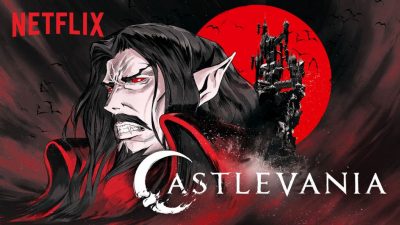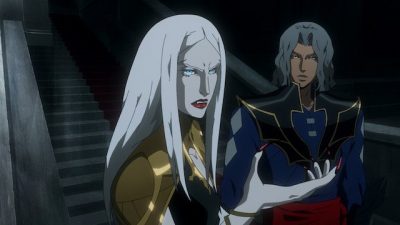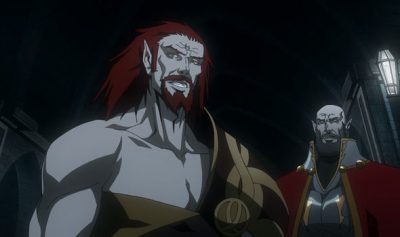
The first season of Castlevania set up the story in mostly broad strokes – the Dracula Lucy relationship was more detailed while the introductions of Trevor Belmont, Tepes’ son Alucard and Speaker Sypha Benades were pretty basic.
Season two gives us backstory on the three, as well as that of two human characters – Isaac and Hector – who are helping Dracula in his war to exterminate humanity.
The first season of Castlevania detailed the relationship between Vlad Dracul Tepes (voiced by Graham McTavish, Game of Thrones) and Lucy (Emily Swallow, Supernatural) that began when she knocked on his castle door and demanded he teach her how to be a doctor.

Castlvania – Dr. Lucy Tepes (Emily Swallow) – Image courtesy of Netflix.
We met Beaumont (Richard Armitage) as a drunken guy in a crap bar – who still takes out a trio of bullies with ease and, when more or less sober, is persuaded to find the Seeker girl Sypha (Alejandra Reynoso, Winx Club) and return her to her group.
We learn that Beaumont’s family was destroyed by The Church – and the Seekers are persecuted by The Church as well.
Beaumont, Sypha and Alucard (James Callis, Battlestar Galactica) first skirmish then, when Alucard declares his intent to kill his father, band together – a philosopher sorceress and two abused Man children.
Hector (Theo James, The Divergent Series) and Isaac (Adetokumboh M’Cormack, This Just In) are Forge Masters who come to Dracula’s side in different ways – and we get episodes that delve into their backstory as well.

Castlevania – Carmille (Jaime Murray), Hector (Theo James) – Image courtesy of Netflix.
Another crucial addition is Carmilla (Jaime Murray, Warehouse 13) – a late arrival who has an agenda of her own. She remains shrouded in mystery.
The major players also include Godbrand (Peter Stormare, John Wick Chapter 2) – a Viking vampire who is abrasive, divisive and headstrong.
Season two of Castlevania, written by Warren Ellis (Transmetroplitan, Global Frequency), the nastiness of season one and expands it. All of the violence is horrendous, but some of it beyond the pale – all of it, though, is integral to a story of war between human and supernatural forces.

Castlevania – Sypha Benades (Alejandra Reynoso), Trevor Beaumont (Richard Armitage), Alucard (James Callis) – Image courtesy of Netflix.
Ellis is a master of characterization – his characters drive the plot rather than the other way around. As a result, there are no moments of idiot plotting where characters behave stupidly or out of character to serve the events of the story.
That’s not to say the characters are always brilliant; sometimes they make stupid mistakes because they misunderstand circumstances or are provoked into them (Beaumont is particularly good at this).
As with season one, the set and prop design range from excellent to exquisite and the range of environments – from rustic villages to country farms and deserts – help set the show’s tone as well as the dialogue (and Ellis is a master of dialogue).
The cast is uniformly excellent – each role inhabited by precisely the right actor. They even make necessary expositional sections entertaining.

Castlevania – Godbrand (Peter Stormare) – Image courtesy of Netflix.
The animation is also generally solid – but in episode six, The River, it’s is pretty amazing (Ellis has apologized to the animators several times for almost breaking them).
Castlevania is Sam Deats’ directorial debut (he directed eight episodes and co-directed the remaining four), and he does a great job of maintaining flow and pacing. He knows when to lay on the blood and gore; when to cut back and focus on just the action, and how to stage emotionally resonating character scenes.
As someone who has never played the game (or even seen it played),I admit to being curious about it after watching the twelve episodes of the series. That doesn’t happen often (or at all).
Castlevania: Season 2 is enthralling stuff – and, at about three-and-a-half hours, is a pretty short binge.
Final Grade: A